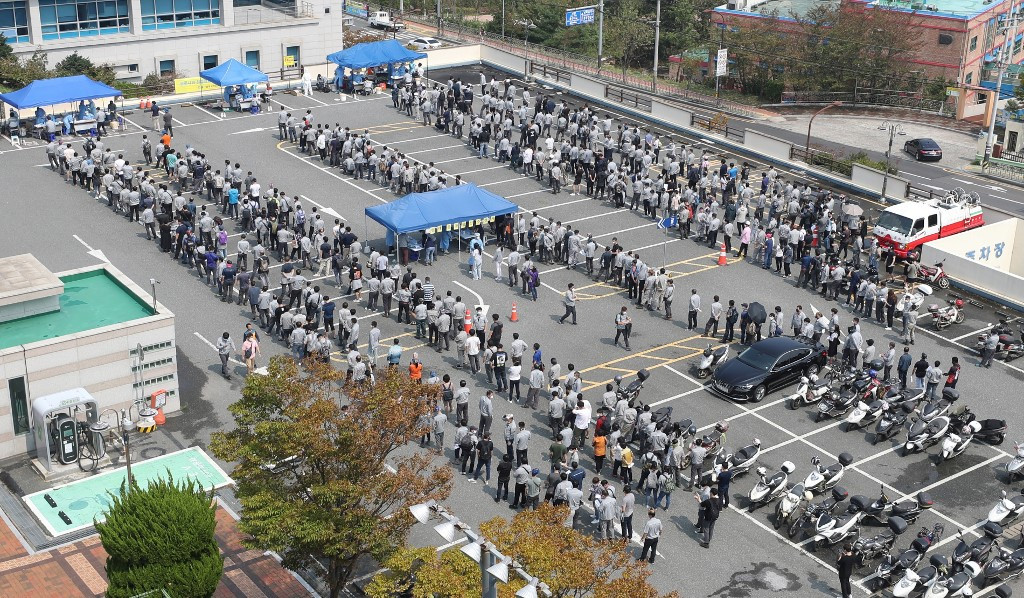Popular Reads
Top Results
Can't find what you're looking for?
View all search resultsPopular Reads
Top Results
Can't find what you're looking for?
View all search resultsWhat South Korea got right about COVID-19 management
With robust information and communications technology infrastructure and strong collaboration between the central government and local administrations, South Korea has set an example on how to handle the virus.
Change text size
Gift Premium Articles
to Anyone
S
outh Korea detected the first imported case of COVID-19 on Jan. 20 during a screening at Incheon International Airport, according to the Centre for Strategic and International Studies (CSIS).
The rate of COVID-19 infection in South Korea then gradually moved to 30 percent until Feb. 17. On Feb. 18, media reported that a 61-year-old Korean woman had tested positive for the virus in Daegu, the country’s third-largest city.
South Korea was among the first countries outside China to see an explosive rate of COVID-19 transmission.
Now, nine months after the first confirmed case, South Korea is considered to have successfully contained the spread of the virus thanks to the country’s invasive testing and contact tracing system.
Lee Ji-hyouk, a research fellow at Seoul National University’s Center for Social Sciences, said during a webinar on Thursday that the country had invested heavily in infectious disease research after battling the Severe Acute Respiratory Syndrome (SARS) and Middle East Respiratory Syndrome (MERS) outbreaks.
Lee explained that South Korea did not have any issues with contact tracing at the beginning of the COVID-19 outbreak, as the cases were centralized in Daegu.
With robust information and communications technology infrastructure and strong collaboration between the central government and local administrations, South Korea has set an example on how to handle the virus.
Read also: South Korea COVID-19 infections 'in full swing' after protest outbreak
Even with its successes, the country reported 583 new coronavirus cases on Thursday, the highest since March, as a third wave of infections has forced it to reimpose tough social distancing measures, Reuters reported.
The daily tally exceeded 500 for the first time since March 6, according to the Korea Disease Control and Prevention Agency (KDCA), when South Korea battled the first major COVID-19 epidemic outside China.
Speaking about Indonesia’s response to the COVID-19 crisis, Lee highlighted some of the issues, such as vulnerable healthcare facilities, scarcity of personal protective equipment (PPE), insufficient number of medical workers, lack of government transparency, densely populated Java Island, conflict between the central government and local administrations and lack of coordination across ministries.
He recalled that at the beginning of the outbreak, when other countries had closed borders and applied travel restrictions, President Joko “Jokowi” Widodo opened the doors wide to travelers.
Furthermore, in February, Health Minister Terawan Agus Putranto called a study by Harvard University public health researchers “insulting” for saying that Indonesia should have reported a coronavirus outbreak and could have undetected cases given its extensive air links to China and the city of Wuhan, the epicenter of the outbreak.
“These messages gave Indonesians [the wrong impression] of the virus,” he said.
When compared with South Korea’s approach in handling COVID-19, he mentioned that the central government and local administrations did not have time to argue.
Lee said President Jokowi may have been more concerned about the potential threat of the virus on the economy, and the structure around him prevented him from making a quick decision.
“We did not have discourse between the central and local administrations,” he said, adding that when it came to Indonesia’s virus response, it was too little, too late. (jes)
Editor’s note: This article is part of a public campaign by the COVID-19 task force to raise people’s awareness about the pandemic.










